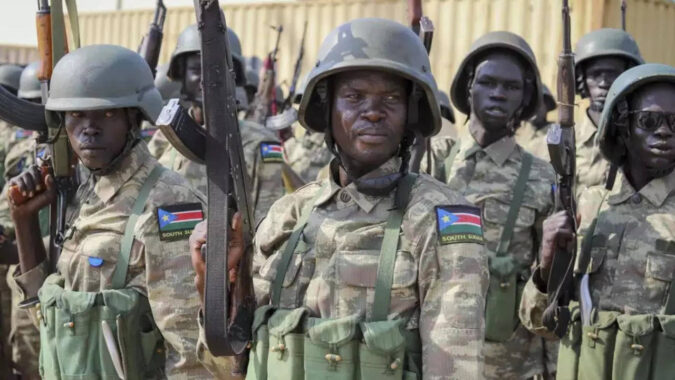GOMA: A regional military force deployed to stabilise the conflict-torn eastern Democratic Republic of Congo is raising suspicions about the role neighbouring countries are playing.
Dozens of armed groups plague eastern DRC, a legacy of regional wars that raged in the 1990s and 2000s.
One group, the M23, has wreaked havoc since re-emerging from dormancy in late 2021.
The M23 rebels, who are allegedly backed by Rwanda, have captured swathes of territory in North Kivu province and displaced hundreds of thousands of people.
The seven-nation East African Community (EAC) decided to create a military force to respond to the crisis last June.
Kenyan soldiers deployed in November, followed in recent weeks by Burundian, Ugandan and South Sudanese contingents.
The total size of the EAC force is unclear, but the troops are entering areas previously occupied by the M23 and are intended to supervise a rebel withdrawal.
Ugandan President Yoweri Museveni said last week his troops were a “neutral force” that would not combat the M23.
The array of foreign troops, and particularly Ugandan ones, is raising suspicions in some quarters in the DRC.
Denis Mukwege, the Congolese doctor who won the 2018 Nobel Peace Prize for helping rape victims in the region, recently tweeted that the EAC force is composed of “destabilising states,” for example.
Congolese MPs also recently asked the defence and foreign affairs ministers for clarifications about the EAC force, and in particular the role of Ugandan troops.
Uganda has a history of interference in eastern Congo. Many are also suspicious of Uganda’s role in the M23 crisis.
According to a report in December by independent United Nations experts, the Ugandan government appeared to have turned a blind eye to M23 fighters moving back and forth over the Ugandan-DRC border, for example.
‘Balkanisation‘ – Congolese government spokesman Patrick Muyaya acknowledged “apprehensions” surrounding the EAC force, during a press briefing on Monday evening.
But he stressed that EAC troops had been deployed as part of a regional push to de-escalate the crisis, and at the invitation of the Congolese government.
“This must not be viewed as balkanisation,” Muyaya said, referring to the division of a country into smaller states.
Since Saturday, M23 fighters have withdrawn from several villages and towns in North Kivu, according to residents interviewed by AFP.
The M23 first came to international prominence in 2012, when it briefly captured North Kivu’s capital Goma before being driven out and going to ground.
But the Tutsi-led group re-emerged in late 2021, claiming that the Congolese government had ignored a pledge to integrate its fighters into the army.
The DRC, as well as the United States, other Western countries and independent UN experts, accuse Rwanda of backing the M23, although Kigali denies this.
The M23 claims to defend marginalised groups in eastern DRC and has consistently called for negotiations with the government.
Dozens of armed groups plague eastern DRC, a legacy of regional wars that raged in the 1990s and 2000s.
One group, the M23, has wreaked havoc since re-emerging from dormancy in late 2021.
The M23 rebels, who are allegedly backed by Rwanda, have captured swathes of territory in North Kivu province and displaced hundreds of thousands of people.
The seven-nation East African Community (EAC) decided to create a military force to respond to the crisis last June.
Kenyan soldiers deployed in November, followed in recent weeks by Burundian, Ugandan and South Sudanese contingents.
The total size of the EAC force is unclear, but the troops are entering areas previously occupied by the M23 and are intended to supervise a rebel withdrawal.
Ugandan President Yoweri Museveni said last week his troops were a “neutral force” that would not combat the M23.
The array of foreign troops, and particularly Ugandan ones, is raising suspicions in some quarters in the DRC.
Denis Mukwege, the Congolese doctor who won the 2018 Nobel Peace Prize for helping rape victims in the region, recently tweeted that the EAC force is composed of “destabilising states,” for example.
Congolese MPs also recently asked the defence and foreign affairs ministers for clarifications about the EAC force, and in particular the role of Ugandan troops.
Uganda has a history of interference in eastern Congo. Many are also suspicious of Uganda’s role in the M23 crisis.
According to a report in December by independent United Nations experts, the Ugandan government appeared to have turned a blind eye to M23 fighters moving back and forth over the Ugandan-DRC border, for example.
‘Balkanisation‘ – Congolese government spokesman Patrick Muyaya acknowledged “apprehensions” surrounding the EAC force, during a press briefing on Monday evening.
But he stressed that EAC troops had been deployed as part of a regional push to de-escalate the crisis, and at the invitation of the Congolese government.
“This must not be viewed as balkanisation,” Muyaya said, referring to the division of a country into smaller states.
Since Saturday, M23 fighters have withdrawn from several villages and towns in North Kivu, according to residents interviewed by AFP.
The M23 first came to international prominence in 2012, when it briefly captured North Kivu’s capital Goma before being driven out and going to ground.
But the Tutsi-led group re-emerged in late 2021, claiming that the Congolese government had ignored a pledge to integrate its fighters into the army.
The DRC, as well as the United States, other Western countries and independent UN experts, accuse Rwanda of backing the M23, although Kigali denies this.
The M23 claims to defend marginalised groups in eastern DRC and has consistently called for negotiations with the government.
